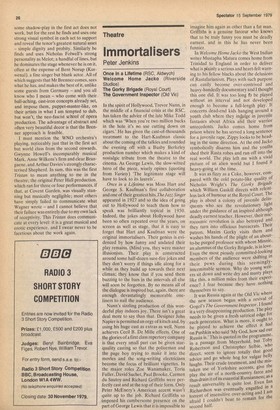Theatre
Immortalisers
Peter Jenkins
Once in a Lifetime (RSC, Aldwych) Welcome Home Jacko (Riverside Studios)
The Gorky Brigade (Royal Court) The Government Inspector (Old Vic) In the spirit of Hollywood, Trevor Nunn, in the middle of a financial crisis at the RSC.
has taken the advice of the late Mike Todd which was 'When you're two million bucks in the hole it's no use cutting down on cigars.' He has given the cast-of-thousands treatment to the Hart-Kaufman classic about the coming of the talkies and rounded the evening off with a Busby Berkeley production number which makes a kind of nostalgic tribute from the theatre to the cinema. As George Lewis, the slow-witted hero of the piece, wisely opines (quoting from Variety) 'The legitimate stage will have to look to its laurels'.
Once in a Lifetime was Moss Hart and George S. Kaufman's first collaboration and one of their greatest hits. The Jazz Singer appeared in 1927 and so the idea of going out to Hollywood to teach them how to speak was brilliantly topical in 1930.
Indeed, the jokes about Hollywood have been so often repeated over the years, on screen as well as stage, that it is easy to forget that Hart and Kaufman were the original immortalisers. Their genius is evi denced by how funny and undated their play remains, (Mind you, they were master illusiohists. Their play is constructed around some half-dozen sure-fire jokes and they don't worry if things idle along for a while as they build up towards their next climax; they know that if you send them buzzing to the bars in the intervals all else will soon be forgotten. By no means all of the dialogue is inspired but, again, there are enough devastatingly memorable oneliners to nail the audience.
Nunn's sizzling production of this wonderful play induces joy. There isn't a great deal more to say than that. Designer John Napier is permitted an orgy of kitsch and, by using his huge cast as extras as well, Nunn achieves Cecil B. De Mille effects, One of the glories of a first class repertory company is that every small part can be given starquality casting so that the policeman and the page boy trying to make it into the movies and the song-writing electricians become the focus of brilliant vignettes. In the major roles Zoe Wanamaker, Toria Fuller, David Suchet, Paul Brooke, Carmen du Sautoy and Richard Griffiths were perfectly cast and at the top of their form. Only Peter McEnery's American accent wasn't quite up to the job. Richard Griffiths so imposed his cumbersome presence on the part of George Lewis that it is impossible to imagine him again as other than a fat man. Griffiths is a genuine farceur who knows that to be truly funny you must be deadly earnest, and in this he has never been funnier.
In Welcome Home Jacko the West Indian writer Mustapha Matura comes home from Trinidad to England in order to deliver what is plainly a serious and heart-felt warning to his fellow blacks about the delusions of Rastafarianism. Plays with such purpose can easily become over-contrived and heavy-handedly documentary and I thought this one did. It was too long to be played without an interval and not developed enough to become a full-length play. It concerns dead-end kids hanging around a youth club where they inciulge in juvenile fantasies about Africa and their warrior antecedents. Jacko comes home from prison where he has served a long sentence for a juvenile rape. Zippy looks, to be head ing in the same direction. At the end Jacko symbolically disarms him and the youths shed their Rasta robes and run off into the real world. The play left me with a vivid picture of an alien world but I found it heavy-going at the time.
It was as fizzy as a Coke, however, compared with the cold potato-like quality of Nicholas Wright's The Gorky Brigade which William Gaskill directs with relentless lack of humour at the Royal Court. The play is about a colony of juvenile delinquents who see the revolutionary light under the guidance of an inspired although deadly earnest teacher. However, their microcosmic revolution is also betrayed and they turn into officious bureacrats. Their patron. Maxim Gorky visits them and washes his hands of the plight of an aboutto-be purged professor with whom Minnie. an alumnus of the Gorky Brigade, is in love. Even the most piously committed-looking members of the audience were shifting in their pews during this seeminglyinterminable sermon. Why do young writers sit down and write dry and musty plays like this, a million miles from their experience? I fear because they have nothing themselves to say. It was Russia again at the Old Vie where the new season began with a revival of Gogol's The Government Inspector. I found it a very disappointing production. The play needs to be given a fresh satirical edge for each generation. What is more, it ought to be played to achieve the effect it had on Pushkin who said 'My God, how sad our Russia is.' This is quoted in the programme, in a passage from Meyerhold, but Toby Robertson and Christopher Selbie, who direct, seem to ignore totally that good advice and go whole hog for vulgar belly laughs. Their crude treatment, and the mistaken use of Yorkshire accents, give the play dt rhaei naiitroof fi t sa e ns so;nt thi-acloRu un st sr iya nfa nrecses and a result universality is quite lost. Even Ian Richardson was eventually engulfed in a torrent of insensitive over-acting and I am afraid I couldn't bear to remain for the second half.


































 Previous page
Previous page